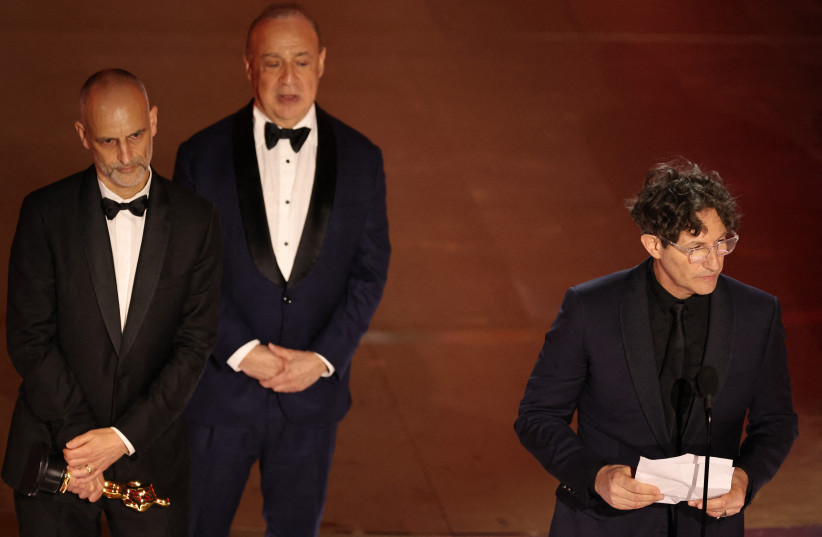Jonathan Glazer’s controversial speech at the 96th Academy Awards last month was endorsed in an open letter by 151 Jews who work in the film industry, according to an exclusive report by Variety on Friday.
This response came only a few weeks after 1,200 Jewish creatives pinned a letter denouncing Glazer's speech - nearly eight times the number of those who defended the director of Zone of Interest’s words. Specifically, Glazer said that he “refuted his Jewishness” and that the Holocaust was “being hijacked by an occupation which has led to conflict for so many innocent people.”
Jewish producers of Glazer’s film had also expressed disapproval regarding his words.
Signatories of the open letter included actors Joaquin Phoenix (Joker), Elliott Gould (American History X, Ocean’s Eleven), Chloe Fineman (Saturday Night Live), David Cross (Arrested Development), Wallace Shawn (Toy Story, The Princess Bride), Ilana Glazer (Broad City), and Debra Winger (Terms of Endearment); directors Todd Haynes (May December, Carol), Boots Riley (Sorry to Bother You), Lenny Abrahamson (Room), Emma Seligman (Bottoms, Shiva Baby), Joel Coen (No Country for Old Men, Big Lebowski, Fargo); and playwright Tom Stoppard (Rosencrantz and Guildenstern are Dead). Signees of the letter also included Israeli filmmakers such as Nadav Lapid and Avi Mograbi.
The letter read: “We are Jewish artists, filmmakers, writers, and creative professionals who support Jonathan Glazer’s statement from the 2024 Oscars. We were alarmed to see some of our colleagues in the industry mischaracterize and denounce his remarks.”.

It also accused those who disapproved of Glazer’s speech of creating a “dangerous distraction from Israel’s escalating military campaign which has already killed over 32,000 Palestinians in Gaza and brought hundreds of thousands to the brink of starvation.”
Further, the letter claimed, that the denouncement of Glazer’s speech has “a silencing effect on our industry, contributing to a broader climate of suppression of free speech and dissent.”
What the letter leaves out
While the letter expressed grief for the victims of the October 7 massacre and called for the safe return of the hostages, it neither explicitly condemned Hamas nor called for the terrorist organization to surrender in Gaza.
The pro-Glazer letter continued with: “we should be able to name Israel’s apartheid and occupation,” and stated that “we are proud Jews who denounce the weaponization of Jewish identity and the memory of the Holocaust to justify what many experts in international law, including leading Holocaust scholars, have identified as a ‘genocide in the making.’”
The letter also referenced other Jewish creatives in the entertainment industry, such as Steven Spielberg and Tony Kushner who decried the killing of innocent Palestinian civilians, the casualties caught in the crossfire of the war, but their names were not attached to the letter.
Spielberg called the Hamas attacks in October “an unspeakable barbarity.”
His USC Shoah Foundation began collecting testimonies and accounts from survivors of the October 7 massacre as part of their Countering Antisemitism Through Testimony Collection initiative, a project that documents post-Holocaust antisemitism.
He also warned that “the machinery of extremism is being used on college campuses,” referring to the rise of antisemitism in higher education establishments in the United States.
The letter ended by calling for a “permanent ceasefire” and by stipulating that it “[rejected] the false choice between Jewish safety and Palestinian freedom.”
“We honor the memory of the Holocaust by saying: Never again for anyone," it concluded.
Glazer has yet to address the diverse responses to his speech.
Jerusalem Post Staff and Jacob Gurvis/JTA contributed to this report.
